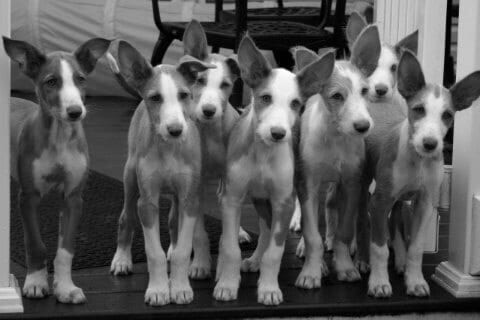
Heart Dog
A spirited Ibizan Hound named Nick became a lifesaver, teacher, and heart dog—forever changing one woman’s life with his love.
Home » Meet The Breeds » Ibizan Hound
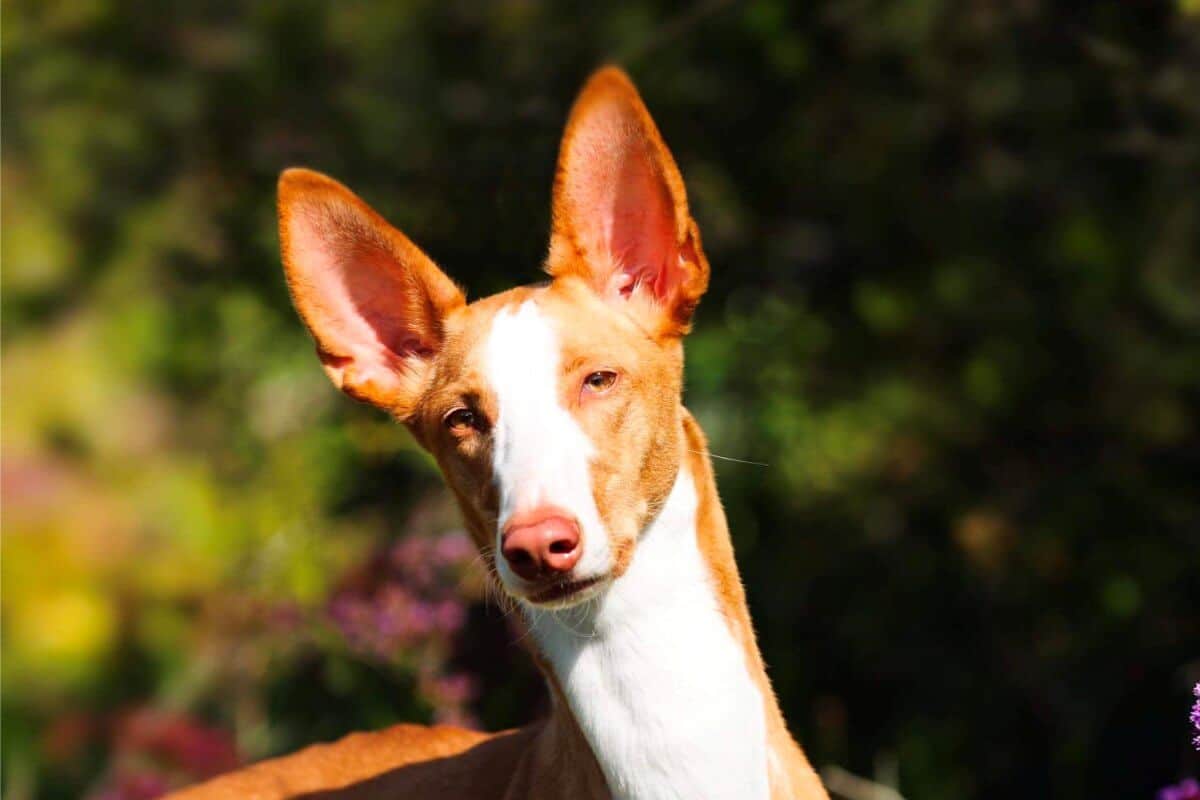
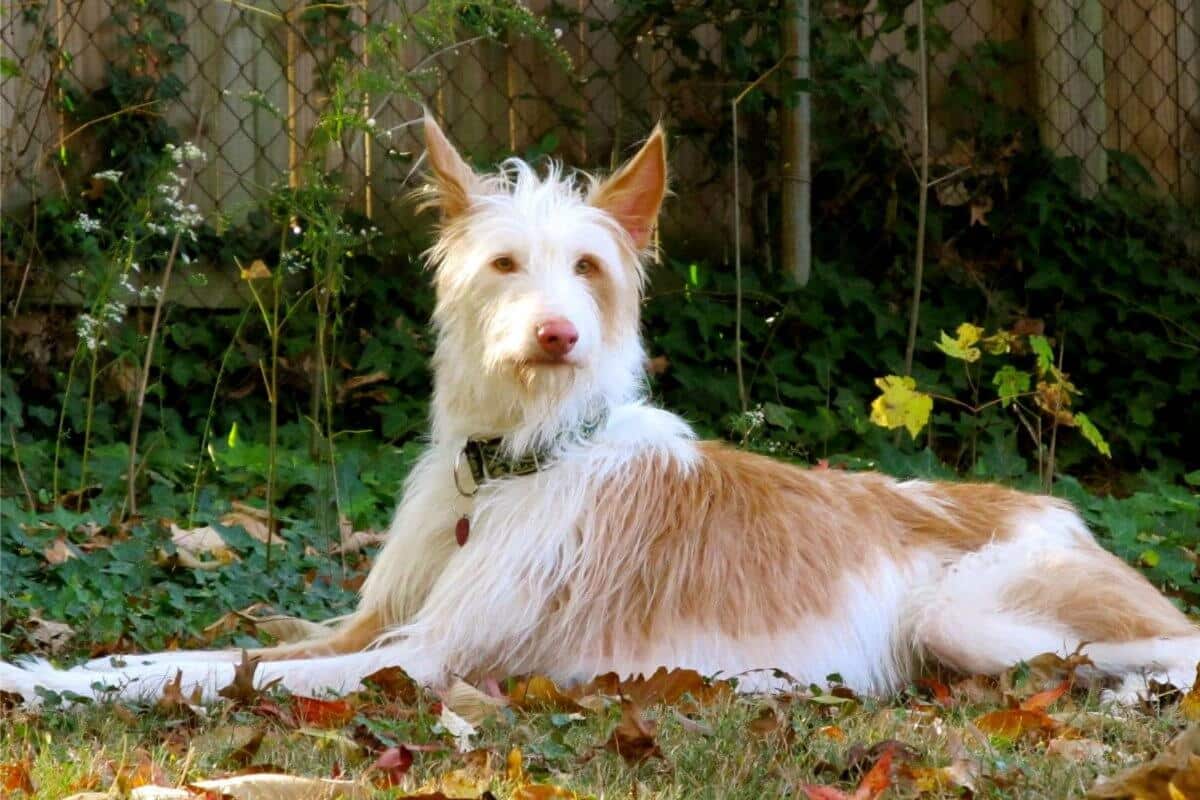
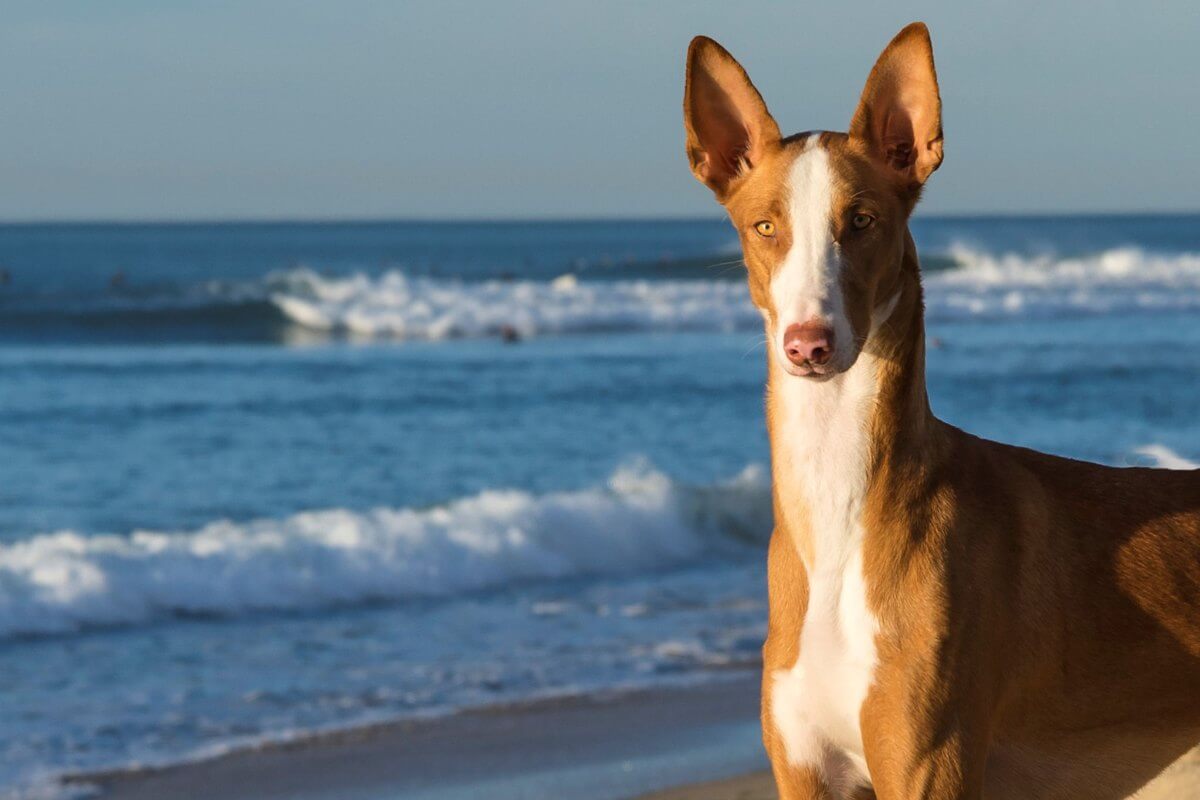
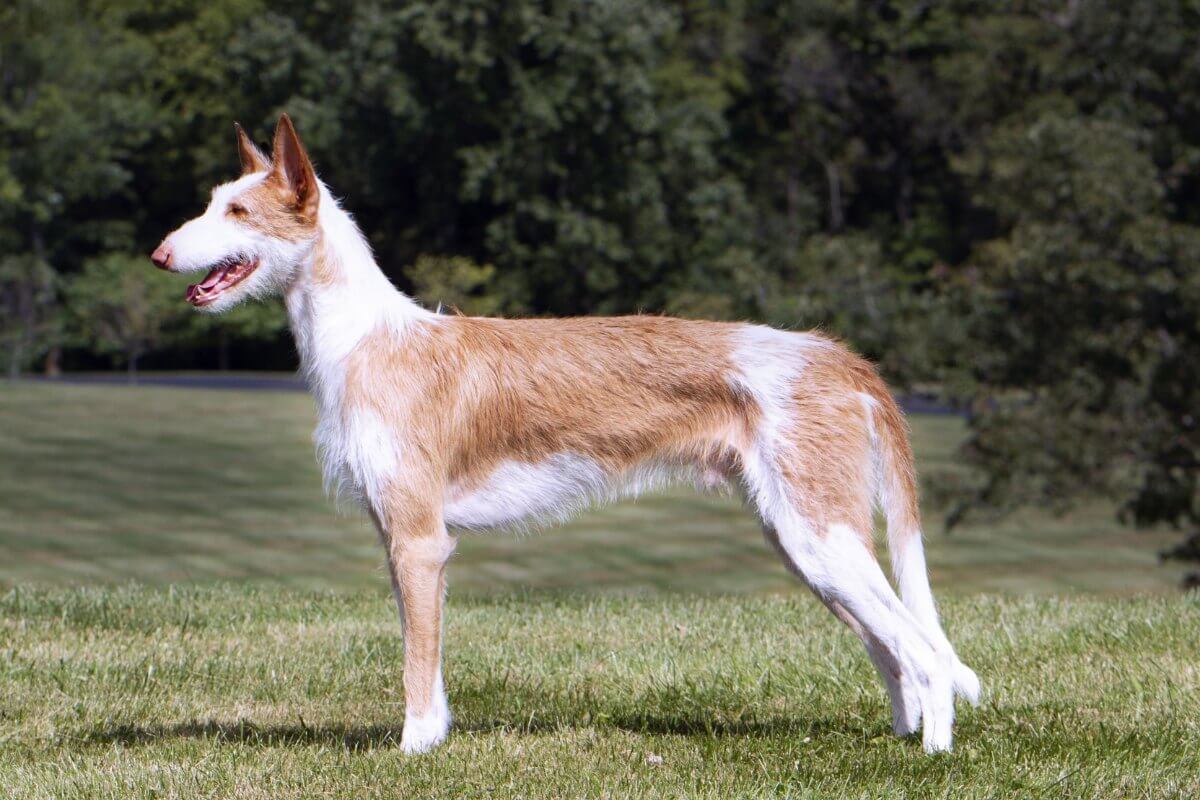
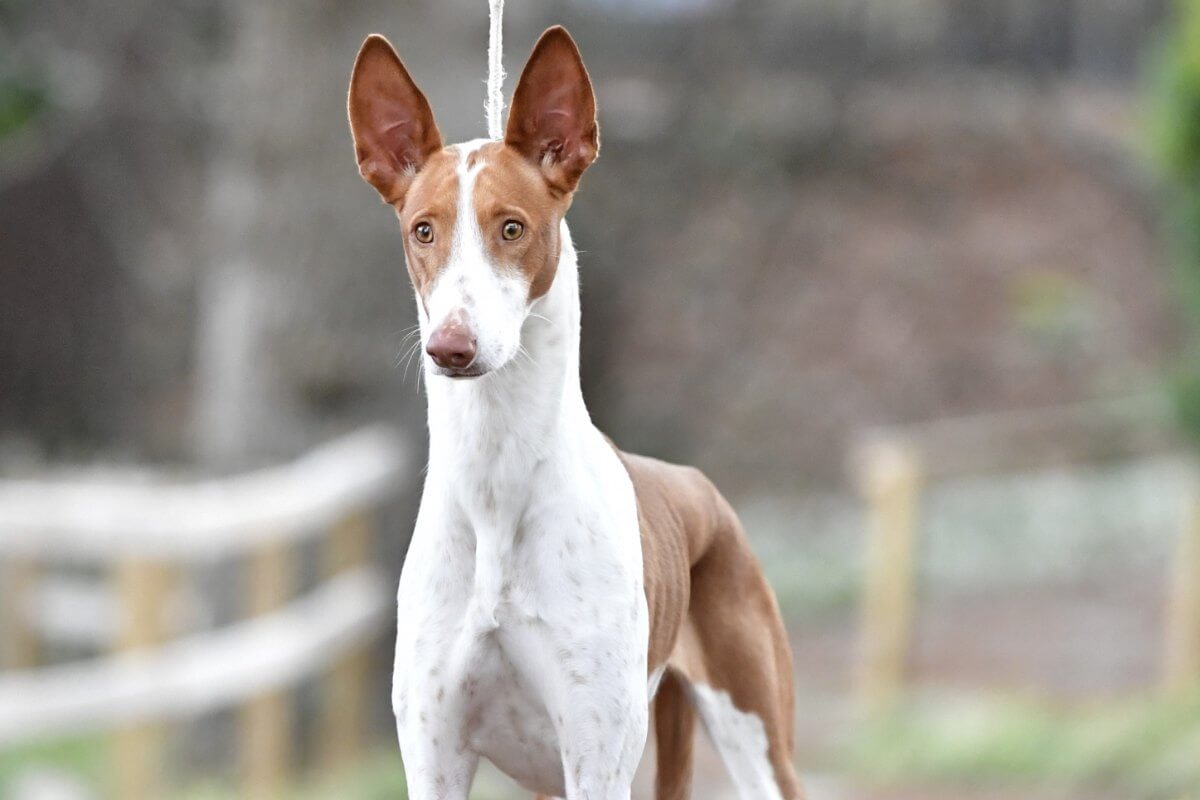
The Ibizan Hound, often referred to as the Ibizan or “Beezer,” is a graceful and primitive sighthound known for its striking appearance and rich history. Native to the Balearic Islands of Spain, especially the Island of Ibiza, this breed boasts an ancient lineage, with origins that trace back to over 3,000 years ago. Recognized for its keen hunting skills, agility, and speed, the breed has long been cherished as both a hunting partner and a beloved companion.
Hound
22.5 – 27.5 Inches
45 – 50 Pounds
11 – 14 Years
| Country of Origin | Spain |
|---|---|
| Bred For | Hunting, Companionship |
| Known For | Large Ears, Light Pigment, Jumping Ability |
| Popularity | Low |
| Temperament | Even-Tempered, Affectionate, Loyal |
| Activities | Hunting, Running, Hiking, Conformation Shows, Dog Sports |
The Ibizan Hound, often recognized for its elegance and grace, possesses a rich history that spans thousands of years. Tracing its roots back to ancient Egypt, depictions of dogs bearing a striking resemblance to the breed can be found on tomb walls, artifacts, and various scripts from the era. These images depict the dogs engaged in hunting alongside their human counterparts, underscoring the breed’s age-old association with the hunt.
The breed’s journey from ancient Egypt to the island of Ibiza, Spain, is the subject of speculation. It’s believed that Phoenician traders, known for their vast maritime networks, played a pivotal role in introducing these dogs to the Balearic Islands around 700-900 BCE. Once on Ibiza, the hounds adapted to the island’s terrain and climate, gradually evolving into today’s Ibizan Hound.
In its new homeland, the dogs were primarily used for hunting rabbits. Their keen sight and hearing, combined with their agile bodies and useful nose, made them perfectly suited for this role. Working in packs or in tandem with other hounds, they showcased their prowess by chasing, cornering, and retrieving game over the rough and rocky terrain of Ibiza.
Despite the breed’s long-standing history, the Ibizan Hound remained relatively secluded on the Balearic Islands until the mid-20th century. It was only in the 1950s that the breed began to gain attention outside of Spain. Its introduction to the United States, and subsequent recognition by the American Kennel Club in 1979, marked a significant milestone in the breed’s history.
The Ibizan Hound’s legacy isn’t limited to its hunting abilities, however. Over the years, the breed has also made its mark in various dog sports and canine activities, proving its versatility. Furthermore, the Beezer’s poised demeanor and distinctive appearance have made it a favorite in the field and among dog show participants alike.
Adult male Ibizan Hounds typically stand between 23.5 and 27.5 inches tall at the shoulder, while mature females usually measure from 22.5 to 26 inches. tall
Male Ibizan Hounds typically weigh around 50 pounds, while females average 45 pounds in weight.
The Ibizan Hound embodies a harmonious balance between strength and elegance. The breed possesses a lean and sturdy frame, built for stamina and agility rather than for bulk. Its build is slightly longer than it is tall, and its deep chest and slender waist are indicative of a breed designed for speed and endurance. These traits are essential for a hound that has historically been used for hunting over rugged terrain.
Texture: The Ibizan Hound sports a coat that can be either short and smooth or long and wiry, with the latter being referred to as the “wire-haired” type. Both coats are dense and have a hard texture that serves to protect the dog, especially while hunting in rough environments. The short coat is especially smooth on the head and ears, longer on the back of the thighs and on the underside of the tail. The wire-haired coat measures from one to three inches in length, with an unkempt appearance and an often generous moustache. In the United States, the two coat types may be interbred.
| Standard Color | |
|---|---|
| Red | ee |
| Red & White | ee |
| White | ee |
| White & Red | ee |
Markings: White Markings
A Note About Color: The coat’s color is white and/or red, either solid or in any combination. The red ranges from a yellowish red, referred to as “lion,” to a deep red. No color or pattern is preferred.
The tail of the Ibizan Hound is a striking extension of its elegant silhouette, adding to the breed’s distinctive appearance. Long, slender, and tapering, the tail is set low and reaches down to the hocks. In moments of excitement or alertness, the tail may be raised but is generally carried low, particularly so when the dog is at rest.
When in motion, the Ibizan’s mobile tail can be seen gently curving, but it never curls over the back. The tail not only contributes to the breed’s aesthetic appearance, it also serves as a rudder during high-speed chases, providing counter-balance and assisting with direction.
When considering an Ibizan Hound for the home, it’s crucial to understand the breed’s unique characteristics, needs, and temperament. As descendants of ancient hunting hounds, Beezers carry traits that can be both delightful and challenging for potential owners. The breed’s elegance, intelligence, and agility are countered with its strong prey drive, independence, and occasional stubbornness. Before embarking on the rewarding journey of Ibizan Hound ownership, one must weigh the breed’s specific requirements against the lifestyle and living situation of the prospective owner.
Generally, Ibizan Hounds are healthy and robust dogs, often displaying fewer hereditary health problems than many other dogs. However, like all breeds and mixed breeds, they are not exempt from potential health concerns. Regular veterinary check-ups and a balanced diet can go a long way towards ensuring any dog’s well-being and longevity.
Lifespan: The average lifespan of an Ibizan Hound ranges between 11 and 14 years, but with proper care, regular check-ups, a balanced diet, and regular exercise, many can thrive beyond these years.
While the Ibizan Hound is generally a hearty breed, it is not immune to certain health conditions. Some of the more common issues seen in the breed include:
Regular veterinary check-ups can help to identify some of these issues before they become major problems. Owners should be proactive in noting any unusual behaviors or symptoms in their hounds and seek veterinary advice when necessary.
The Ibizan Hound, traces its roots back to ancient times. It embodies a unique blend of a regal character and great intelligence, combined with an exuberant playness. The breed radiates a gentleness, but it can also be a formidable hunter. This combination typically makes the Beezer an opportunistic and enchanting companion. Potential owners, however, should acquaint themselves with the intricacies of the breed’s temperament before taking on the responsibility of welcoming one (or two) into the home.
Ibizan Hounds are inherently friendly and good-natured, but they do possess an independent streak. This trait might make them a tad challenging for novice owners who are not familiar with the nuances of dog behavior. A consistent training approach, complemented by an understanding of canine idiosyncrasies, tends to yield the best results with this breed.
One standout trait of the Ibizan Hound is its sensitivity. These dogs have a penchant for forming deep bonds with their families, making them highly responsive to household dynamics. Their emotional tuning means that positive reinforcement during training sessions tends to resonate deeply with them.
Companionship ranks high on the list of the Beezer’s needs. Extended periods of solitude can lead to throes of separation anxiety at times. To avoid bouts of depression or destructiveness, these hounds are best matched with families that can offer regular interaction each and every day.
While Ibizan Hounds have the capacity to get along well with other dogs, especially if raised with them, the breed’s inherent prey drive can cause these hounds to view smaller animals as potential prey. It is therefore crucial for owners to always make sure proper introductions are made and maintain vigilant supervision during interactions between members of the household menagerie.
Some children will find a gentle and patient companion in the Ibizan Hound. As is the norm with all dogs, however, it is imperative for adults to see that all interactions are made under watchful supervision, and to instill in young kids the correct manner for approaching and handling a dog.
Initially reserved around unfamiliar faces due to the breed’s history as a vigilant hunting dog, the Ibizan Hound tends to warm up and become more welcoming with time. Any initial wariness with strangers can be eased with early and consistent socialization, which supports that typically friendly Beezer demeanor.
Feeding an Ibizan Hound requires an understanding of the breed’s specific nutritional needs and energy levels. As an agile and active breed, this hound’s dietary needs might differ slightly from other dogs of their size.
When it comes to feeding an Ibizan puppy, it’s essential to provide a nutrient-rich diet that supports rapid growth and development. Puppies usually have higher energy demands, so a diet that is tailored for high energy and growth is recommended. As they transition into adulthood, their dietary needs will change.
An adult Ibizan Hound will require a balanced diet that caters to the individual’s energy levels while preventing any unnecessary weight gain. High-quality commercial dog foods, especially those formulated for active breeds, often provide the right balance of nutrients. The amount of food an Ibizan requires can vary based on activity level, age, and metabolism. On average, these dogs might consume about 2 to 3 cups of good quality dry dog food per day, divided into two meals. However, this is a general guideline, and it’s always best to consult with a veterinarian to determine the exact feeding amount suitable for a particular dog.
It’s essential to monitor a Beezer’s weight and adjust the feeding amount as needed. Overfeeding or providing a diet lacking in essential nutrients can lead to health issues. Offering a mix of dry kibble with occasional wet food or wholesome homemade treats can provide variety and keep the hound interested in its meals.
It’s essential to always have fresh water readily available for the Ibizan Hound. Hydration is just as crucial as nutrition, especially for such an active breed.
Training an Ibizan Hound offers a unique experience, colored by the breed’s intelligence, independence, and hunting heritage. The journey to training these elegant hounds requires patience, consistency, and an understanding of their intrinsic nature.
Ibizans are smart, which can sometimes be a double-edged sword. On one hand, they pick up on commands and cues quickly, but on the other, their intelligence can make them a bit self-willed, often figuring out ways to outsmart their owners. This trait underlines the importance of starting early on training and being consistent throughout the journey.
Despite their poised appearance, Ibizan Hounds can be surprisingly vocal. Their tendency to bark, especially when they spot something intriguing or feel the need to alert their family, can be managed with proper training. Teaching them commands like “quiet” or “enough” can be particularly beneficial in curbing excessive barking.
The breed’s hunting lineage is evident in the Ibizan’s keen sense of smell and strong prey drive. These hounds are always on the alert, and anything that moves swiftly, be it a squirrel in the backyard or a leaf blowing in the wind, can capture their attention. This implies that while they may excel in activities that harness their hunting instincts, they might also be prone to chasing, making recall training essential.
Additionally, their intelligence shines in various dog sports and activities, where their problem-solving skills and agility come to the forefront. However, it’s also essential to understand the Ibizan Hound’s potential for wanderlust. Given a chance, a Beezer might decide to go on an exploratory adventure, emphasizing the importance of a secure yard and proper leash training.
In all training endeavors with an Ibizan Hound, positive reinforcement methods yield the best results. These versatile hounds respond well to praise, treats, and play, each a useful tool that is effective in shaping desired behaviors.
The Ibizan Hound, renowned for its agility and speed, possesses an innate zest for life that is palpable in its exercise needs. This breed thrives on activity and requires regular exercise to keep both its body and mind engaged.
| Energy Level | High |
|---|---|
| Exercise Requirements | 2 Hours/Day (Minimum), Daily Walks, Vigorous Running, Regular Exercise, Playing with Another Dog, Mental Stimulation |
With their origins in hunting, Ibizans are naturally energetic dogs. They flourish in open spaces where they can stretch their legs, run, and jump. Regular play sessions in a securely fenced yard or park can be immensely beneficial. Their agile nature and keen senses also make them excellent candidates for activities such as Lure Coursing or Agility Trials.
However, their energy is not just about physical intensity. Ibizan Hounds are also playful, often displaying puppy-like antics well into their adult years. Games that challenge their intelligence, like puzzle toys or hide-and-seek, can be just as satisfying for them as physical play.
While they are active dogs, Ibizans are also known for their elegance and grace. Their movements can sometimes seem almost cat-like, with a mix of spirited dashes and poised moments of pause. This blend of energy and elegance means that while they cherish their playtime, they also value moments of relaxation and will often be found basking in the sun or enjoying a quiet moment with their family.
It’s essential for owners of Ibizan Hounds to strike a balance in their dog’s exercise routine. While it’s crucial to ensure they get their daily dose of activity, it’s equally important not to over-exert them, especially in extreme weather conditions. This hound’s sleek coat doesn’t offer much protection against harsh elements, so care should be taken during very hot or cold days.
Grooming an Ibizan Hound is an exercise in understanding the unique characteristics of the breed’s coat and skin. With a sleek appearance and minimal coat fuss, the Beezer offers a relatively low-maintenance grooming routine, but it still requires specific attention to make certain the dog remains in prime condition.
| Coat Type | Two Types; Untrimmed, Short or Wire-Haired, Hard-Textured |
|---|---|
| Grooming Requirements | Weekly Brushing, Occasional Bathing, Routine Ear Cleaning, Periodic Nail Trimming, Regular Tooth Brushing |
The coat of an Ibizan Hound can be smooth or wire-haired. Regardless of the type, the coat is left untrimmed. This means that shedding does occur, but it is minimal compared to other breeds. However, a regular brushing session once a week can help to remove any loose hairs and will ensure the coat maintains its natural vitality. For those with the wire-haired variety, occasional hand-stripping might be needed in order to maintain the coat’s texture.
Bathing an Ibizan Hound doesn’t have to be a frequent affair. Given the breed’s modest coat and generally clean nature, baths can be reserved for when the dog gets particularly dirty or starts to emit a doggy odor. Using a dog-specific shampoo can help to maintain the coat’s natural oils and safeguards the skin from drying out.
Beyond coat care, other grooming essentials include regular cleaning of the ears, as their erect shape can be a magnet for debris and dirt. Dental hygiene is another vital aspect, with regular brushing or dental chews helping to prevent tartar build-up while maintaining good oral health.
The Ibizan Hound’s nails, if not naturally worn down through activity, will need periodic trimming. It’s essential to ensure they aren’t too long, as overly long nails can lead to discomfort and even injury.
Living with an Ibizan Hound is an engaging experience that reflects the breed’s unique blend of elegance, energy, and loyalty. These dogs adapt well to various living conditions, but there are specific considerations to guarantee their well-being and happiness.
When it comes to apartment living, an Ibizan can make adjustments, provided its exercise needs are consistently met. These hounds don’t require vast expanses to roam, but they do need daily physical activity to maintain their overall health and even temperament. If residing in an apartment, regular walks combined with some playtime can suffice.
Their coat, as sleek and short as it is, doesn’t offer Ibizan Hounds substantial protection against extreme weather conditions. In colder climates, Beezers might require a doggy sweater or jacket to keep them warm during outdoor activities. Conversely, in hot weather, it’s imperative to protect them from direct sun exposure for prolonged periods and ensure they have ample fresh water always available.
The breed’s gentle and affectionate nature makes the Ibizan a great companion. These dogs are generally calm indoors, often content lounging on a comfortable spot after their exercise needs have been met. However, they are known to have a mischievous side, and their heightened senses, especially their hearing, can sometimes make them alert or reactive to noises. A quiet and predictable home environment is generally more suitable for them.
Safety is paramount, especially given the Ibizan Hound’s hunting instincts and agility. A securely fenced yard or outdoor area provides space where these hounds can play without risk of chasing after something or wandering off. Their innate curiosity and athleticism makes every Beezer an adept jumper, so providing barriers of adequate height is essential.
The arrival of a litter of Ibizan Hound puppies brings with it a whirlwind of energy, curiosity, and sheer joy. These little hounds, with their sharp senses and agile bodies, are a delight to observe as they navigate their new world. From tender moments of bonding to teaching basic manners in the house, raising a Beezer puppy is a journey filled with rewards and responsibilities.
From the moment they are born, Ibizan Hound puppies are alert and inquisitive. Their early days are crucial for both the physical and mental development of each pup, and the care each receives during this time sets the foundation for its adult life.
One of the first considerations is nutrition. A Beezer puppy grows rapidly, and its diet should support this growth. A high-quality puppy food, rich in essential nutrients and tailored to medium and large breed puppies, is vital. Feeding guidelines provided on pet food packages or recommendations from a veterinarian can guide the quantity and frequency of meals.
Socialization is another pivotal aspect of an Ibizan puppy’s upbringing. Between the ages of 3 to 14 weeks, youngsters are especially receptive to new experiences. Exposing the pup to a variety of environments, people, and other animals in a positive and controlled manner during this window can help to shape both temperament and behavior as an adult.
Training should commence early, capitalizing on a puppy’s malleable nature. While Ibizan Hound pups are intelligent, their independent streak can sometimes pose training challenges. Positive reinforcement techniques, using treats, praise, and toys, are generally the most effective.
Regular health check-ups are essential to monitor the Ibizan pup’s development and to catch any potential health concerns early on. Routine vaccinations, deworming, and flea and tick preventatives play a crucial role in safeguarding overall health.
Lastly, the Ibizan Hound puppy’s living environment needs to be puppy-proofed. A young Beezer’s curiosity means it will likely explore every nook and cranny. Ensuring a safe environment, one that is devoid of harmful objects and choking hazards, is paramount in the early weeks and months.
The Ibizan Hound, with its vibrant energy and keen senses, is tailor-made for a multitude of dog sports. Engaging these hounds in strenuous pursuits will not only capitalize on a hound’s natural talents, it can also strengthen the bond between hound and handler. A few of the dog sports that provide a great outlet for the Beezer include:
Incorporating these activities and dog sports into an Ibizan Hound’s routine will all but assure the dog remains stimulated, healthy, and happy, thus fortifying the special bond it shares with its favorite person.
The Ibizan Hound is recognized by the world’s leading registries and kennel organizations, which categorize the breed into a specific Group based on its unique characteristics. This breed is recognized worldwide under the following Group designations:
| Organization | Group Designation |
|---|---|
| AKC (American Kennel Club) | Hound |
| UKC (United Kennel Club) | Sighthound and Pariah Dog |
| CKC (Canadian Kennel Club) | Hounds |
| ANKC (Australian National Kennel Council) | Hounds |
| RKC (The Royal Kennel Club) | Hound |
| FCI (Fédération Cynologique Internationale) | Group 5: Spitz and Primitive Types; Section 7: Primitive Type-Hunting Dog |
The ideal Ibizan Hound is described by a Breed Standard that is approved by each of the world’s leading registries and kennel organizations. The Breed Standards for this breed may be found in the following links:
| Organization | Breed Standard |
|---|---|
| American Kennel Club | AKC Ibizan Hound Breed Standard |
| United Kennel Club | UKC Ibizan Hound Breed Standard |
| Canadian Kennel Club | CKC Ibizan Hound Breed Standard |
| Australian National Kennel Council | ANKC Ibizan Hound Breed Standard |
| The Royal Kennel Club | RKC Ibizan Hound Breed Standard |
| Fédération Cynologique Internationale | FCI Ibizan Hound Breed Standard |
The Ibizan Hound, an affectionate and elegant breed, has caught the attention of many dog enthusiasts and has consequently led to the formation of clubs dedicated to the preservation, promotion, and well-being of this breed.
In the United States, the primary organization dedicated to the Ibizan Hound is the Ibizan Hound Club of the United States (IHCUS). The IHCUS is committed to safeguarding the breed’s written Standard, advocating for responsible breeding practices, and providing educational resources for both owners and enthusiasts.
In Canada, the Ibizan Hound Club of Canada (IHCC) takes a leading role in promoting the breed. The IHCC offers competitive events, educational materials, and networking opportunities for Canadian Ibizan Hound lovers.
In the United Kingdom, the English Ibizan Hound Club stands as the foremost authority on the breed. Founded in 1966, this club boasts a rich history and remains steadfast in its dedication to preserving and promoting the breed’s legacy in the UK.
Joining a club can provide invaluable resources such as connecting with experienced breeders, attending breed-specific events, and accessing a wealth of knowledge about the Ibizan Hound.
An Ibizan Hound might occasionally find itself in a situation requiring rescue or rehoming. Fortunately, several dedicated organizations are committed to ensuring these majestic dogs will always find the loving homes they deserve.
In the United States, the Ibizan Hound Club of the United States (IHCUS) runs a dedicated rescue program. This organization focuses on aiding and rehoming Beezers in need, placing them permanently in safe and caring environments. The volunteers’ efforts not only provide relief to hounds in distress, they also offer potential adopters an avenue to join a community of people that shares a love for the breed.
Ibizan Hounds are generally known for their reserved and calm demeanor. While they are not excessively vocal, they may bark or alert their owners to unfamiliar sounds or strangers. Like all dogs, their noise level can vary based on individual temperament and training.
Ibizan Hounds can adapt to apartment living, provided they receive adequate exercise and mental stimulation. These are active dogs that require regular walks and play sessions to maintain their health and happiness. A well-exercised Beezer is more likely to be calm and relaxed indoors.
Yes, Ibizan Hounds are excellent climbers. Their agility and jumping ability make them adept at scaling obstacles, which historically aided them in hunting over the rough and rocky terrain of Ibiza. It’s not uncommon for them to easily jump fences or climb onto higher surfaces.
No breed is truly hypoallergenic, but Ibizan Hounds are generally known for their hard coats, which may produce fewer allergens than thicker-coated breeds. However, individuals with allergies should spend time with the breed to gauge any reactions before deciding to bring one into the home.
Absolutely. Ibizan Hounds are known for their loyalty and deep bond with their families. They can be reserved with strangers, but with their loved ones, they are affectionate, gentle, and deeply connected.
The Ibizan Hound is not black in color. The standard colors for the breed are white, red, or a combination of red and white. While there may be occasional variations, black is not a recognized color for the breed.
Yes, Ibizan Hounds shed, although their shedding is generally considered minimal compared to many other breeds. Their short, fine coat requires minimal grooming, but regular brushing can help to reduce any loose hair and keep their coat in top condition.
Yes and no. Ibizan Hounds are classified as sighthounds by several canine registries. This means they rely primarily on their keen sense of sight to spot and pursue prey. In some countries, however, the breed is considered a primitive-type hunting dog due to its isolated development. Historically, and no matter their classification, they have been used to hunt rabbits and other small game across rocky terrain.

A spirited Ibizan Hound named Nick became a lifesaver, teacher, and heart dog—forever changing one woman’s life with his love.

Living with an Ibizan Hound: A high-energy, intelligent breed that thrives with active owners, social interaction, and care.
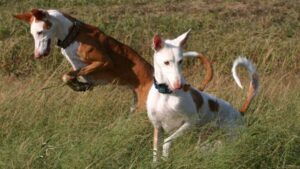
Judging Ibizan Hounds: focus on balance, joint flexion, ear shape, and function as a lithe, elegant, powerful hunting breed.
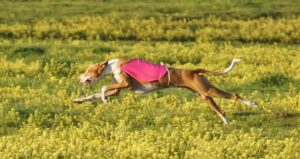
Uncover the timeless allure of the Ibizan Hound, from ancient origins to modern breed standards. Expert insights await.
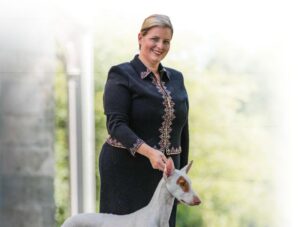
Mastering the art of Ibizan Hound presentation: expert tips and insights for showcasing their natural grace and beauty.
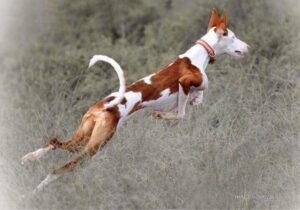
Discover the unique front assembly of the Ibizan Hound: A perfect blend of balance, flexibility, and functionality. Learn more!

2025 AKC Hound Group Honoree Sarah Murphy shares insights on breeding, temperament, and presenting the Ibizan Hound.

Meet Breeder/Owner Handler Curtis Freeling as he shares insights on breeding, owner handling, mentorship, and success in dog shows.

Meet Alexandria Mitchell-Lynch, passionate Ibizan Hound breeder, Owner Handler, and proud advocate for preserving breed quality.
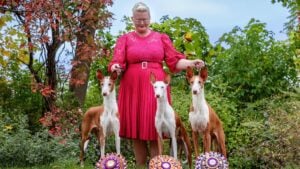
Sarah Murphy of Abbaio shares her passion for Ibizan Hounds, responsible breeding, and the elegance of this unique breed.
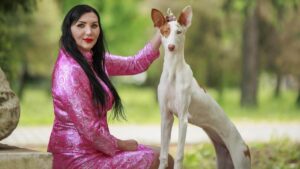
Ethical Podenco Ibicenco breeding rooted in health, function, and preservation – balancing tradition with modern tools.

Veterinarian Katie Belz shares her journey with Ibizan Hounds, breeding, health, and promoting performance and community in the breed.
The best way to ensure a long and happy relationship with a purebred dog is to purchase one from a responsible breeder. Not sure where to begin?
Contact the National Parent Club’s Breeder Referral Program, which is listed on the AKC Breeder Referral Contacts page.
